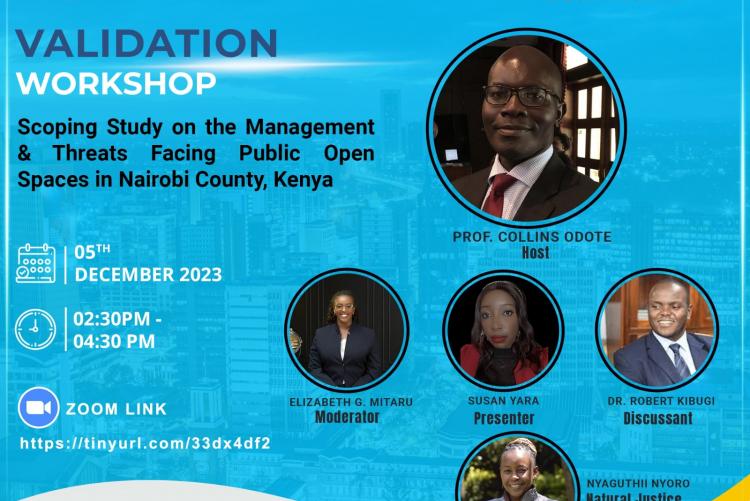On 5th December 2023, a validation workshop was held to explore ‘The Management and Threats Facing Public Open Spaces in Nairobi, Kenya. The workshop provided a platform for experts and stakeholders to delve into the critical issues surrounding the conservation and sustainability of urban green spaces. Hosted by Prof. Odote, the Assistant Dean of the Faculty of Law, and featuring Susan Yara as the presenter, the workshop shed light on the critical issues facing Nairobi's public open spaces.
Susan Yara's presentation centered on the study examining the management and threats facing public open spaces in Nairobi County. Green open spaces in Kenya are essential urban areas developed and managed by public authorities to provide recreational, environmental, and visual benefits to the community. These spaces, under the jurisdiction of national or county governments, face increasing threats such as conversion, degradation, and deforestation.
The threats to public open spaces have escalated in recent years, leading to the shrinkage and degradation of these vital areas. Factors such as rapid urbanization, poor planning, weak management, and illegal alienation contribute to the deterioration of ecosystem services. Public open spaces in Nairobi City are particularly vulnerable to congestion and decay, highlighting the pressing need for effective conservation measures.
The study emphasized the importance of adhering to the duties and obligations outlined in the Constitution of Kenya 2010 and Sustainable Development Goal 11(6). The latter seeks to ensure universal access to safe, inclusive, and accessible green and public open spaces The study highlighted several key urban green spaces, such as Uhuru Park, John Michuki Memorial Park, Karura Forest, and City Park. These spaces were identified as crucial for providing recreational opportunities, improving air quality, enhancing the city's natural beauty, supporting biodiversity, and serving as venues for community gatherings.
Ms.Yara noted that Respondents acknowledged the significance of protecting urban green spaces, citing benefits such as recreational opportunities, improved air quality, enhanced natural beauty, support for wildlife and biodiversity, and spaces for community gatherings. However, these ecosystem services are threatened by various challenges, including encroachment, pollution, vandalism, and lack of maintenance.
Survey results revealed that 61% of respondents perceived lack of resources and funding as the primary challenge in managing Nairobi's urban green spaces. Other challenges included limited community engagement, insufficient awareness, enforcement issues, and political interference. Respondents proposed solutions, with 64% suggesting increased funding, 14% emphasizing community engagement and public awareness, and 98% expressing the need for increased government investment.
Ms. Yara further noted To overcome these challenges, critical actions need to be done, including improving urban planning processes, fostering collaboration among stakeholders, investing in public awareness, promoting sustainable land-use practices, and strengthening policy enforcement. Long-term funding mechanisms and innovative financing models were highlighted to support sustainable management and ensure resilience in the face of urbanization and environmental pressures.
On his part, Professor Collins Odote underscored the importance of a legislative framework for green spaces, emphasizing the government's mandate to protect the environment. He acknowledged that green spaces are crucial for public enjoyment and called for free access to these areas.
the Validation Workshop shed light on the management challenges and threats facing public open spaces in Nairobi. The comprehensive study, backed by community perspectives and legal considerations, provides a foundation for addressing the issues at hand. As Nairobi continues to grow, it is imperative to implement effective strategies and legislation to ensure the preservation and accessibility of these urban green oases for current and future generations.

